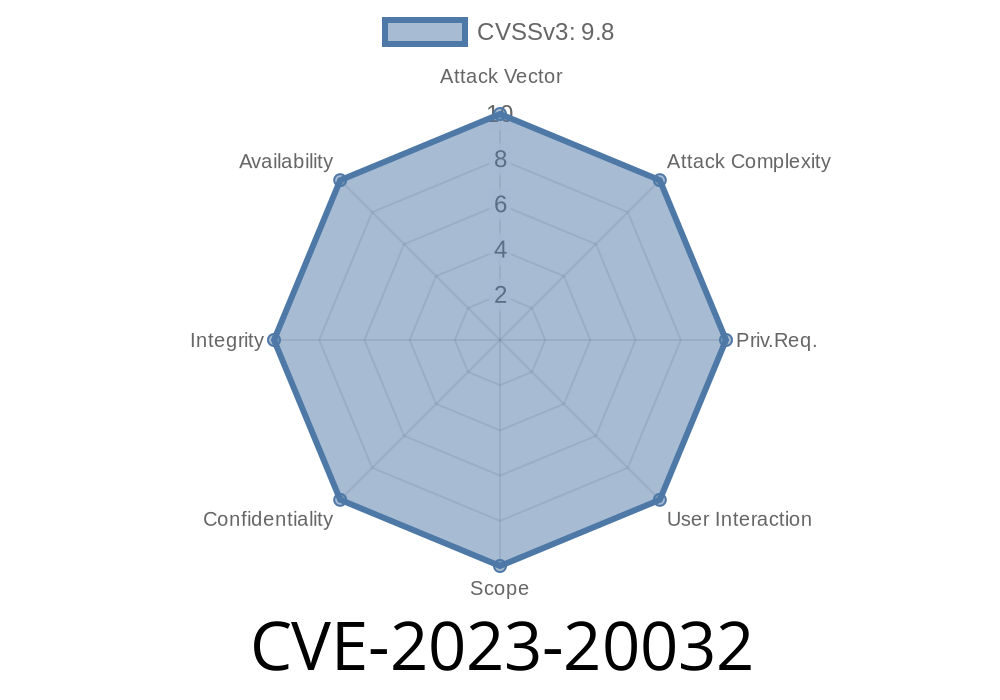On February 15, 2023, a critical new vulnerability was disclosed in the popular open-source antivirus engine, ClamAV. This vulnerability, tracked as CVE-2023-20032, impacts ClamAV versions 1.. and earlier, .105.1 and earlier, and .103.7 and earlier. Let's break down what happened, how attackers might exploit this problem, and how you can protect your machines from compromise.
What Is CVE-2023-20032? A Quick Explainer
CVE-2023-20032 targets a bug in the HFS+ partition file parser within ClamAV. HFS+ (Hierarchical File System Plus) is a file system used commonly by older Apple devices, and ClamAV includes scanning support for this format.
The vulnerability is due to a missing buffer size check in the code that parses HFS+ partitions. This oversight leads to a heap buffer overflow—a classic, dangerous bug where data written by the software spills over into the system's memory in places it should never go. When exploited, this can let an unauthenticated remote attacker run any code they like, with the same privileges as the ClamAV process. In other words, someone could take control of your server—or at a minimum, crash ClamAV and cause a Denial of Service (DoS).
Technical Details: How the Vulnerability Works
When ClamAV opens or scans a crafted HFS+ partition file, it doesn’t double-check the size of certain data pointers it reads. Here’s a simplified version of the vulnerable code:
// Vulnerable code snippet (simplified)
uint32_t folderCount = read_uint32(buffer + offset);
HFSPlusCatalogFolder folderList[folderCount]; // No size check!
for (int i = ; i < folderCount; i++) {
folderList[i] = parse_catalog_folder(buffer + nextOffset);
nextOffset += sizeof(HFSPlusCatalogFolder);
}
Notice the bug? The code trusts the value of folderCount as read straight from the input file, without checking if it's a reasonable number. If an attacker submits a file where folderCount is, say, one million, ClamAV will allocate a massive chunk of memory for folderList. Worse, if crafted just right, this can overflow the memory ClamAV has access to, corrupting adjacent data—something attackers can use to hijack the process.
> In short: By sending a malicious HFS+ partition file to a ClamAV-protected system, an attacker can crash or take control of that system.
Trigger Heap Overflow and Payload Execution
- During scanning, the vulnerable code reads the file, overflows memory, and (if all goes well for the attacker) executes the shellcode.
Here’s an example, in pseudo-code, of crafting a malicious input file
# Example pseudo-code for building a malicious file
with open("evil.hfs", "wb") as f:
f.write(b"HFSPLUS") # File signature
f.write(struct.pack("<I", x10000000)) # Ridiculously huge folder count
# Continue adding malicious payload...
# The details here depend on memory layout/exploitation goals
An actual, working exploit would need a deep understanding of both HFS+ and ClamAV’s internal memory management, but this is the basic pattern.
Remote Code Execution (RCE):
If successful, attackers can run commands on your system, install malware, or pivot deeper into your network.
Privilege Level:
The unauthorized code runs as the ClamAV process user—on some setups this is root, which makes things much worse.
Download latest version:
https://www.clamav.net/downloads
Verify your version:
$ clamscan --version
ClamAV 1..1/...
Disable HFS+ scanning if you can't upgrade:
Temporarily disabling HFS+ support is challenging (contact the ClamAV support channels for config options).
Additional Resources & References
- ClamAV Security Blog: CVE-2023-20032
- CVE Details
- Official ClamAV Release Notes
Final Thoughts
CVE-2023-20032 is a textbook lesson in why even the most well-audited and open-source security tools can contain catastrophic bugs. If you haven’t patched your ClamAV installation yet, do so right now—and if you run antivirus on critical systems, consider fuzz testing and limiting permissions to minimize future damage.
Stay safe, and watch those patch alerts!
*Written exclusively for this platform. Do not reproduce without permission.*
Timeline
Published on: 03/01/2023 08:15:00 UTC
Last modified on: 03/10/2023 01:15:00 UTC
